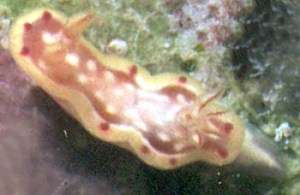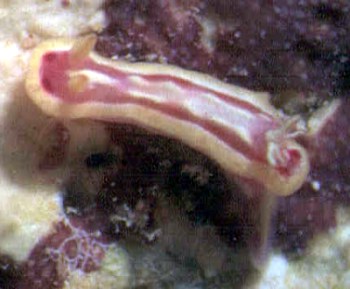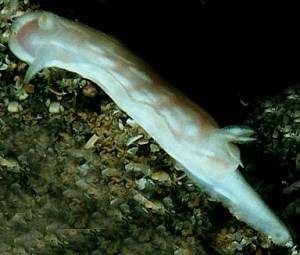
Noumea? sp. 2.
Order: NUDIBRANCHIA
Suborder: DORIDINA
Superfamily: EUDORIDOIDEA
Family: Chromodorididae
PHOTO
Pulau Kaledupa [Tukang Besi Archipelago, SE Sulawesi, Indonesia], 14.5 m on coral rubble. Size: 8 mm. June 1999. PHOTO: Lindsay Warren.
See message below.
Authorship detailsRudman, W.B., 2000 (April 1) Noumea? sp. 2. [In] Sea Slug Forum. Australian Museum, Sydney. Available from http://www.seaslugforum.net/find/noumsp2
Related messages
Re: Noumea? sp. 2 from Reunion Island
May 21, 2009
From: Sully et Monika Bachel


Concerning message #22434:
Hello Bill
Another Noumea sp 2 observed at Mauritius Island by my wife Monika.
Locality: Flic en Flac, 15 m, Mauritius, Indian Ocean, 10 May 2009. Length: 12 mm. Photographer: Sully Bachel.
Best regards
Sully Bachel
s.bachel@orange.fr
Bachel Sully, 2009 (May 21) Re: Noumea? sp. 2 from Reunion Island. [Message in] Sea Slug Forum. Australian Museum, Sydney. Available from http://www.seaslugforum.net/find/22471
Thanks Sully,
Best wishes,
Bill Rudman
Noumea? sp. 2 from Reunion Island
May 7, 2009
From: Sully Bachel


Concerning message #2185:
Hello Bill
Here is a nudibranch which looks like Noumea, but I'm not sure, or a juvenile form of Glossodoris pallida ?
Locality: Cap La Houssaye St Paul, 14 m, Reunion Island, Indian Ocean, 25 April 2009. Length: 10 mm. Photographer: Sully Bachel.
What is your opinion ?
Best regards
Sully
http://seaslugs.free.fr/nudibranche/f_intro.htm
s.bachel@orange.fr
Bachel S., 2009 (May 7) Noumea? sp. 2 from Reunion Island. [Message in] Sea Slug Forum. Australian Museum, Sydney. Available from http://www.seaslugforum.net/find/22434
Dear Sully,
This is what I have been calling Noumea? sp 2 although the shape of the mantle suggests it could be a Thorunna. I have mentioned before that I am sure I have seen an illustration of this - perhaps in one of Bergh's reports - but I still have not been able to locate it so perhaps I am just having a slight delusion.
Best wishes,
Bill Rudman
Noumea? sp 2 from the Red Sea
May 8, 2006
From: Binyamin Koretz

Hi Bill,
This little fellow seems quite similar to the one in Lindsay Warren's message (#2188) from Sulawesi, which you designated as Noumea? sp 2.
Locality: Eilat, Yatush Area, 28m, Israel, Red Sea (Gulf of Eilat), 31 March 2006, sea grass and patch reef. Length: 7 mm. Photographer: Binyamin Koretz.
regards
Binyamin
binyamin@koretz.net



Dear Binyamin,
It is indeed Noumea? sp. 2. As I said in earlier messages, I have a vague feeling I have seen a painting of this in an old book, so I went for a bit of a hunt. I didn't find what I think I was looking for but I did find the painting alongside in a paper by Pruvot-Fol (1933: Plate 1, fig 9) on animals from the Red Sea collected by Robert Dollfus [after who the spectacular Hypselodoris dollfusi is named].
It does not solve the identity of Noumea? sp. 2 , but it does illustrate some of the problems we face identifying old names. Pruvot-Fol specifically states that the colours of the animals in her colour plate are the colours of the animals after preservation in formalin. How long they had been in formalin she does not say, but as they were collected in 1928 it could have been anything up to three or four years. So the only similarity I guess between your animals and her painting is the probability that the white spots in her painting have not changed. I cant be altogether confident about that though, because some colours fade quickly in preservative, and all we can say about an opaque white spot like this in a preserved animal is that before preservation it was a pigmented spot - but it could have been purple or red or perhaps yellow. Pruvot-Fol tentatively identified it as Goniobranchus albomaculatus Pease, 1866 [see message #13232] but considered it was different enough to warrant a special name as a 'variety' - Glossodoris albomaculata var erythraea. Unfortunately there is not enough information in her radula description to decide what genus her animal belonged to so I guess the name should be considered what we call a nomen nudum [= nude name] - a name without enough information to make sense of.
I am pretty sure your animal is not Pruvot-Fol's but whether it is or not I think we will need to start again.
-
Pruvot-Fol, A., (1933) Mission Robert Ph. Dollfus en Egypte. Opisthobranchiata. Memoires de l'Institut d'Egypte, 21: 89-159, pls. 1-4.
Best wishes,
Bill Rudman
Noumea sp. 2? from Sulawesi
July 19, 2000
From: Lindsay Warren

Dear Bill
Rich Smith found this specimen on 3 June 1999 at a depth of 19.6 m on a sponge covered in algae where it was gliding along. This was on Pulau Kaledupa [Tukang Besi Archipelago, SE Sulawesi, Indonesia - Operation
Wallacea]. Size: 6mm. Photo: Lindsay Warren
It is similar to the earlier animal from Sulawesi which you posted on 4 April as Noumea? sp. 2 but it lacks the
red spots. It is in fact closer to Valda Fraser's photo which you posted on the same page the next day. The body is deep pink with a pale cream mantle margin and irregular patches on the notum. The gill plume has five branches. There is a pale pink stripe towards the top of the lamellate retractile rhinophores which are white / translucent. The foot is also pink with pale cream patches on it. There is some similarity to Glossodoris sp (photo 116) on page 78 of Terry Gosliners' Nudibranchs of Southern Africa.
What are your thoughts on this?
All the best
Lindsay
alldcl@compuserve.com
Warren, L., 2000 (Jul 19) Noumea sp. 2? from Sulawesi. [Message in] Sea Slug Forum. Australian Museum, Sydney. Available from http://www.seaslugforum.net/find/2752Dear Lindsay,
I am glad you asked for my thoughts, rather than an answer. I was just thinking today that 'publishing' on the Forum is quite diferent from formal publication in print. In formal publishing the author is in complete control. They can choose the species they will discuss and leave out those that are 'unfinished business'. This gives the impression of an efficient scientist with all the answers. One of the values of the Forum is that it shows to the world the our science is largely 'unfinished business' and we still have much to discover.
This animal is a good example. From your earlier specimen it would have been reasonable to assume that red spots around the border was a good character for the species. However Valda's photo, and now yours, suggest that red spots are optional. Obviously only the anatomy can tell us, but I woud suspect that all these are the same species. If you look carefully, there are a pair of red spots at the front of the mantle, and a pair behind the gills. Both these pairs of spots are in the spotted animal in your earlier message. It is certainly possible that Terry's animal is also a colour variant.
As I said to Valda earlier, I have a vague feeling I have seen a painting of this animal in an old publication - but where?
Best wishes,
Bill Rudman.
Noumea? from South Africa
April 5, 2000
From: Valda Fraser

Dear Bill
I think that this is a Noumea. Can you say which one it is? Thanks.
Locality: South Coast KwaZulu-Natal SOUTH AFRICA. Park Rynie - 25m
Date: March 2000
Size: 12mm
Regards
Valda Fraser
iti04937@mweb.co.za
Fraser, V., 2000 (Apr 5) Noumea? from South Africa. [Message in] Sea Slug Forum. Australian Museum, Sydney. Available from http://www.seaslugforum.net/find/2185Dear Valda,
I think this is probably the same - or very similar, to Noumea sp. 2 from Sulawesi. It hasn't got the red spots in the band around the mantle border, but otherwise its very similar. I still have this feeling I have seen a drawing or painting of this animal, but so far I can't remember where.
Best wishes,
Bill Rudman.
Noumea? sp from Sulawesi
April 4, 2000
From: Lindsay Warren

Dear Bill
The first specimen (upper right) of this unidentified chromodorid was found by Rich Smith at 11 am on 30 June 1999 at a depth of
14.5 m in a sheltered position on coral rubble on Pulau Kaledupa [Tukang Besi Archipelago, SE Sulawesi, Indonesia - Operation Wallacea]. Size: 8 mm.
The second specimen (lower photos) was found by Dean Lea at 7am on 30 July 1999 at a depth of 8 m moving over encrusting coral on a slope on Pulau Hoga [Tukang Besi Archipelago). Size: 7 mm.
The mantle margin is either pale creamy yellow or white, the notum peachy orange with irregular white patches. In the mantle margin are several conspicuous red spots. The rhinophores are lamellate, retractile,
translucent white with an orange streak slightly off centre. The gills are also translucent white with a streak of orange. The foot is peachy orange with white patches.
Any ideas as to what it might be?
All the best
Lindsay Warren
100014.2112@compuserve.com


Dear Lindsay,
This reminds me of something but I can't quite put my finger on it. It has that almost 'violin'-like shape of some species of Noumea, so it possibly a species of that genus.
If I remember, or come across the description I am thinking of I'll let you know. In the meantime if anyone recognises this please let us know.
Best wishes,
Bill Rudman.
